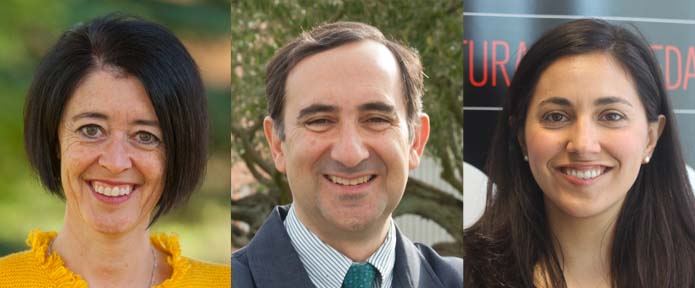A book offers new perspectives on how theological concepts and religious practices relate to politics, society and economics
Political Theology in Medieval and Early Modern Europe, edited by Montserrat Herrero, Jaume Aurell and Angela C. Miceli, is part of the Religion and Civil Society project at the Institute for Culture and Society

Montserrat Herrero, Associate Professor of Political Philosophy and Principal Investigator of the Religion and Civil Society project (ICS), Jaume Aurell, Professor of Medieval History and Theory of History, an ICS collaborator and Director of the Business and Humanism Institute, and Angela Miceli, a former Religion and Civil Society post-doctoral fellow (2013-2016)
A recent book from the University of Navarra provides new historical and theoretical perspectives on political theology from an interdisciplinary approach that draws from political philosophy and theology, along with art and history. Entitled Political Theology in Medieval and Early Modern Europe, this book comes from the Religion and Civil Society project at the Institute for Culture and Society (ICS).
Political theology studies how theological concepts and religious practices relate to politics, society, and economics. Although the relationship between Christianity and politics has long been debated, as an academic discipline it began at the end of the twentieth century and was in large part initiated by Carl Schmitt.
The book’s editors include Montserrat Herrero, Professor of Political Philosophy and Principal Investigator of the Religion and Civil Society project (ICS), Jaume Aurell, Professor of Medieval History and Theory of History, ICS collaborator and Director of the Business and Humanism Institute, and Angela Miceli, a former Religion and Civil Society post-doctoral fellow (2013-2016). It was published by Brepols, which, according to Scholarly Publishers Indicators, is one of the five most prestigious publishers in the world in the field of history.
The volume is divided into two parts. The first focuses on the formation of the concept of political theology, especially from authors such as Carl Schmitt, Erns Kantorowicz and Henri de Lubac.
The second part analyzes the development of the term, with changes between the temporal and the spiritual, historical events (such as crusades, royal wisdom, the idea of tolerance), discourses, rites and representations from the Middle Ages to the modern period.
The entire volume demonstrates the fecundity of the concept in different fields from the humanities and social sciences. This includes the influence of the configuration of traditional monarchies on the relationship between mystical and political bodies, the social tensions that occur when politics and religion are dysfunctional, and the role of symbols when recreating new concepts, values and practices, both political and religious.
The book shows examples of the application of the concept of political theology to written discourses, ritual ceremonies and visual representations. On the basis of this evidence, it suggests revising the thesis focused on the modern world’s progressive secularization, or at least the thesis that this supposed secularization should not be taken for granted as a linear and progressive process, and that in many instances it is reciprocal.
Authors from five countriesThe book includes interdisciplinary contributions that address political theology from different specialties, including philosophy, theology, history, law, art history and anthropology.
William T. Cavanaugh (DePaul University, USA), Antonio Bento (University of Southern California, USA), Manuel Alejandro Rodríguez de la Peña (San Pablo CEU University), Martin Aurell (University of Poitiers, France) José María Silva Rosa (University of Beira Interior, Portugal), Simon Kow (King's College, UK), Rafael García Pérez (University of Navarra), Juan Pablo Domínguez (University of Navarra), Rita Costa Gomes (Towson University, USA), Vinni Lucherini (University of Naples, Italy), Xavier Barral i Altet (University of Rennes, France), Laurent Hablot (University of Poitiers, France), Marta Serrano-Coll (The Public University of Tarragona) and Elena Kashina (York University, UK).
The authors use a wide variety of sources from narrative texts— such as philosophical and theological narratives from John of Paris, Spinoza, Locke, Bayle, Leibniz, Tocqueville, Montesquieu—rites (both in royal coronation and liturgical ceremonies) and visual representations (different types of images such as coats of arms, banquets and scenes from royal coronations) over a period of time ranging from the Middle Ages to the twentieth century.
